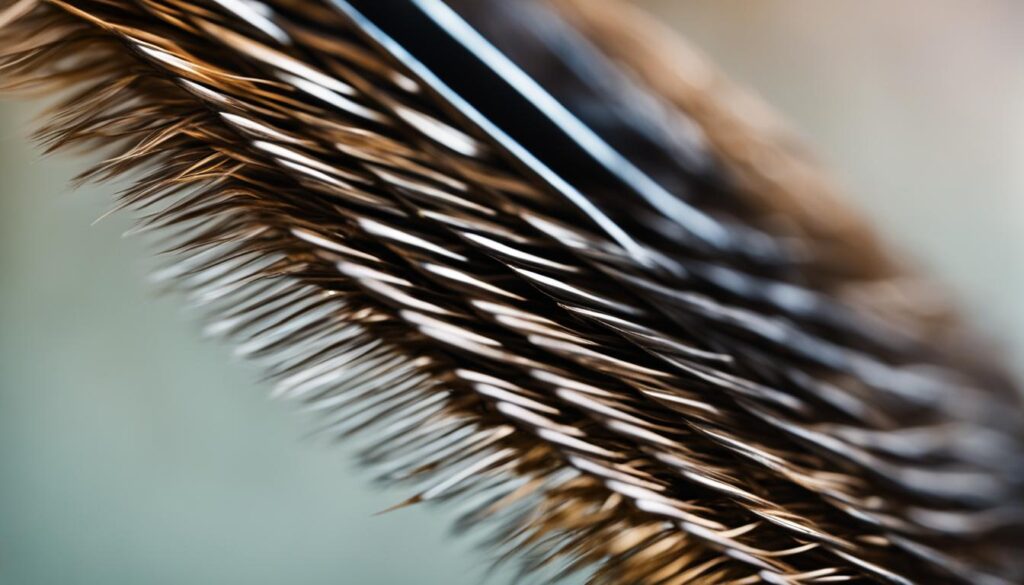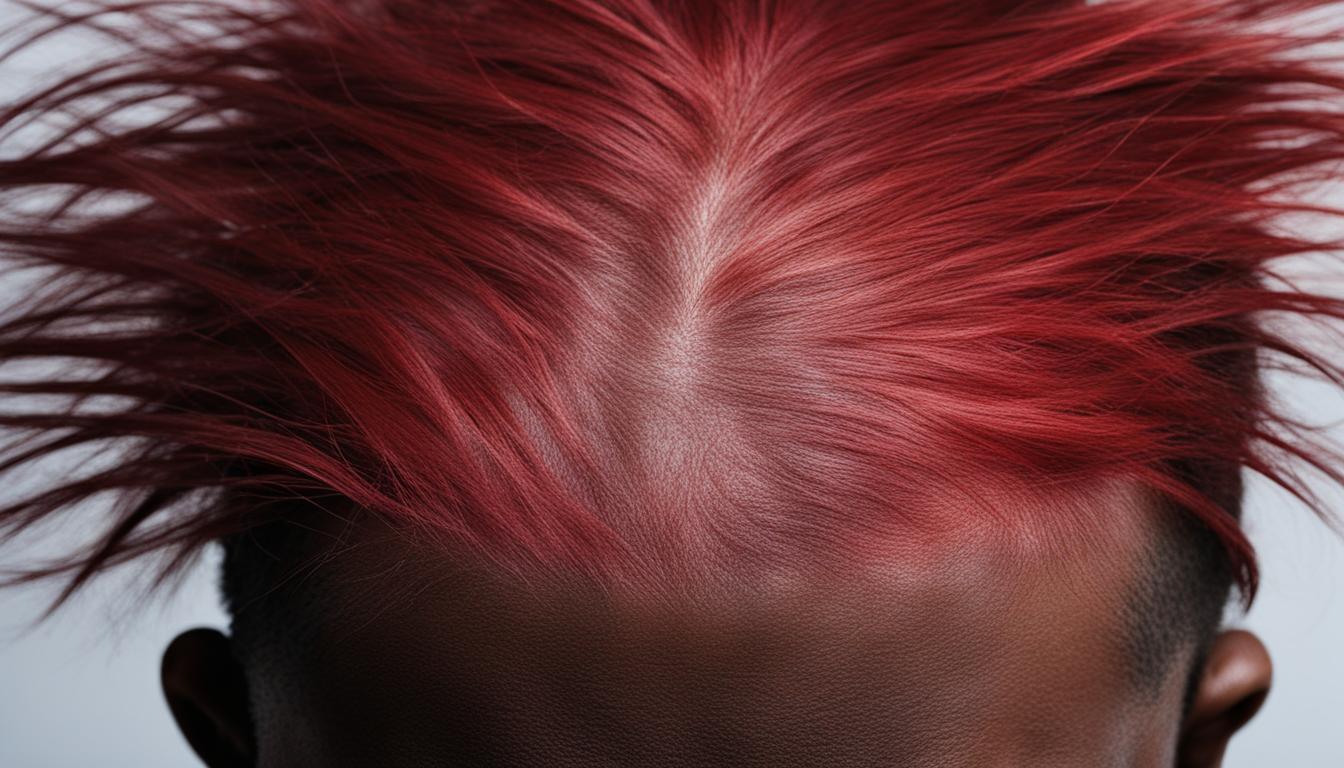Does Stress Cause Hair Loss?
Stress is a common part of everyday life, and many people have experienced the physical and emotional toll it can take. But can stress actually cause hair loss? In this article, I will explore the relationship between stress and hair loss, as well as the different types of hair loss that are associated with high stress levels.
Key Takeaways:
- High levels of stress can lead to three types of hair loss: telogen effluvium, trichotillomania, and alopecia areata.
- Telogen effluvium occurs when stress pushes hair follicles into a resting phase, causing sudden hair loss.
- Trichotillomania is an irresistible urge to pull out hair as a way of coping with stress.
- Alopecia areata is thought to be triggered by severe stress and occurs when the immune system attacks hair follicles.
- Consult a doctor if you experience sudden or patchy hair loss, or more hair loss than usual.
- Treating the underlying medical condition and managing stress can help promote hair regrowth.
The Link Between Stress and Hair Loss
Research has shown that there is a strong relationship between stress and hair loss. While it may not be the sole cause, chronic stress has been found to contribute to hair loss in both men and women. A study conducted on mice revealed that a stress hormone called corticosterone can impair the stem cells necessary for hair growth. This means that chronic stress can inhibit hair follicle regeneration and keep hair follicles in a resting phase, leading to reduced hair growth.
Furthermore, researchers discovered that corticosterone acts on a cluster of cells called the dermal papilla, which prevents the secretion of GAS6, an activating molecule for hair follicle stem cells. While further research is needed to determine if the same mechanism applies to humans, these findings provide valuable insights into the link between stress and hair loss.
Managing stress levels is crucial in maintaining healthy hair. Techniques such as relaxation exercises, meditation, and therapy can help in stress management. Additionally, adopting a healthy lifestyle, including a balanced diet, regular exercise, and adequate sleep, can promote overall well-being and potentially support hair regrowth. It’s important to seek support from healthcare professionals if experiencing significant hair loss or if stress levels are impacting daily life.
Understanding the Impact
While the precise effects of stress on hair loss in humans require further investigation, it is evident that chronic stress plays a role in hair health. By addressing and managing stress levels, individuals can potentially mitigate the impact of stress-related hair loss and support hair regrowth.
Understanding Telogen Effluvium
Telogen effluvium is a common type of temporary hair loss that can occur due to various stressors or changes in the body. During the telogen phase of the hair growth cycle, which lasts approximately two to three months, up to 70% of hair follicles are in a resting state. At the end of this phase, the hair sheds and is replaced by new hair. In telogen effluvium, an increased number of hairs prematurely enter the resting phase and eventually shed, leading to noticeable hair loss.
This condition can be categorized into two types: acute and chronic telogen effluvium. Acute telogen effluvium typically lasts less than six months and is often triggered by a specific event or stressor, such as surgery, childbirth, or emotional trauma. On the other hand, chronic telogen effluvium lasts longer than six months and may not have a clear identifiable cause.
While telogen effluvium can affect anyone, it is more commonly observed in women and individuals assigned female at birth. The hair shedding is usually diffuse and affects the top of the head, giving the appearance of thinner hair. It’s important to note that telogen effluvium does not result in complete baldness, as the shedding hair is replaced by new hair in the anagen phase of the hair growth cycle.

In summary, telogen effluvium is a temporary condition characterized by increased hair shedding due to stress or changes in the body. It can occur in both acute and chronic forms, with the latter lasting longer than six months. While it can be distressing to experience hair loss, telogen effluvium is usually reversible, and the hair will regrow once the underlying cause has been addressed. If you’re concerned about hair loss, it’s always best to consult with a healthcare professional to determine the cause and appropriate management strategies.
The Impact of Telogen Effluvium on the Body
Telogen effluvium, a temporary form of hair loss, has various effects on the body. This condition occurs when hairs prematurely enter the resting phase, leading to increased shedding. While losing up to 100 strands of hair per day is considered normal, those experiencing telogen effluvium may shed up to 300 strands daily.
“Telogen effluvium primarily affects the hair on the top of the head and may not result in total baldness.”
It is important to note that telogen effluvium does not pose a direct physical health risk but can have significant psychosocial and psychological effects. The emotional stress associated with hair loss can lead to feelings of anxiety, depression, and a negative impact on overall well-being.
The Emotional Stress of Hair Loss
Experiencing hair loss can be emotionally distressing, affecting self-esteem and confidence. It is crucial to address the emotional impact of hair loss and seek support from healthcare professionals or support groups. Talking openly about your feelings and concerns can help alleviate the emotional stress associated with telogen effluvium.
- Seeking therapy or counseling can provide a safe space to express emotions and develop coping mechanisms.
- Engaging in activities that promote self-care and self-esteem can boost confidence levels.
- Connecting with others who have experienced similar hair loss can provide a sense of belonging and support.
Remember, telogen effluvium is a temporary condition, and with proper stress management and care, hair regrowth is possible. It is essential to consult a healthcare professional for an accurate diagnosis and guidance on the best course of treatment for your specific situation.
Disclaimer: The image above is for illustrative purposes only and does not directly represent the effects of telogen effluvium.
Coping with Hair Loss and Stress
Dealing with hair loss caused by stress can be challenging, but there are ways to cope and manage both the physical and emotional effects. It’s important to remember that you are not alone in this experience and that support is available to help you navigate this difficult time.
One way to manage stress and promote hair regrowth is through various stress reduction techniques. Practices like relaxation exercises, meditation, and deep breathing exercises can help calm the mind and reduce anxiety levels. Therapy can also be beneficial in providing guidance and support in addressing underlying stressors and developing healthy coping mechanisms.
In addition to managing stress, it’s crucial to seek professional guidance from healthcare providers to address any underlying medical conditions that may be contributing to hair loss. They can assess your overall health, identify any potential deficiencies or hormonal imbalances, and recommend appropriate treatments or lifestyle adjustments to support hair regrowth.
Adopting a healthy lifestyle can also play a significant role in promoting hair regrowth and overall well-being. Eating a balanced diet rich in essential nutrients like vitamins, minerals, and proteins can provide the building blocks necessary for healthy hair growth. Regular exercise not only helps reduce stress but also improves blood circulation, which can benefit the scalp and hair follicles. Lastly, getting adequate sleep is important as it allows your body to repair and regenerate, including the hair follicles.

Conclusion
Stress and hair loss are indeed linked, with various conditions like telogen effluvium, trichotillomania, and alopecia areata being associated with high stress levels. Research has shown that chronic stress can impair hair follicle regeneration, leading to reduced hair growth. While further studies are needed to fully understand the mechanisms underlying this relationship, the importance of stress management for maintaining healthy hair cannot be overstated.
Managing stress is crucial in promoting hair regrowth. Techniques such as relaxation exercises, meditation, and therapy can help in stress management. Seeking support from healthcare professionals for underlying medical conditions and exploring treatment options for hair loss, if necessary, are important steps to consider. Additionally, adopting a healthy lifestyle, including a balanced diet, regular exercise, and adequate sleep, can contribute to overall well-being and potentially support hair regrowth.
In conclusion, it is clear that stress can have a significant impact on hair health. By understanding the link between stress and hair loss, individuals can take proactive steps to manage their stress levels and address any underlying issues. By doing so, they can promote healthy hair regrowth and overall well-being.
FAQ
Does stress cause hair loss?
Yes, stress can be related to hair loss. There are three types of hair loss associated with stress: telogen effluvium, trichotillomania, and alopecia areata.
What is telogen effluvium?
Telogen effluvium is a type of temporary hair loss that occurs due to a stressor or change in the body. It causes increased hair shedding during the resting phase of the hair growth cycle.
What are the effects of telogen effluvium on the body?
Telogen effluvium primarily affects the hair on the top of the head and may cause significant hair shedding. In severe cases, it can also impact other areas such as eyebrows and body hair.
How can I cope with hair loss and stress?
Coping with hair loss caused by stress involves managing and reducing stress levels. Techniques such as relaxation exercises, meditation, and therapy can help in stress management. Seeking support from healthcare professionals and adopting a healthy lifestyle are also essential.
Can hair regrow after stress-related hair loss?
Yes, treating the underlying medical condition and managing stress can help promote hair regrowth. However, it’s important to consult a doctor if you experience sudden or patchy hair loss or more hair loss than usual.







